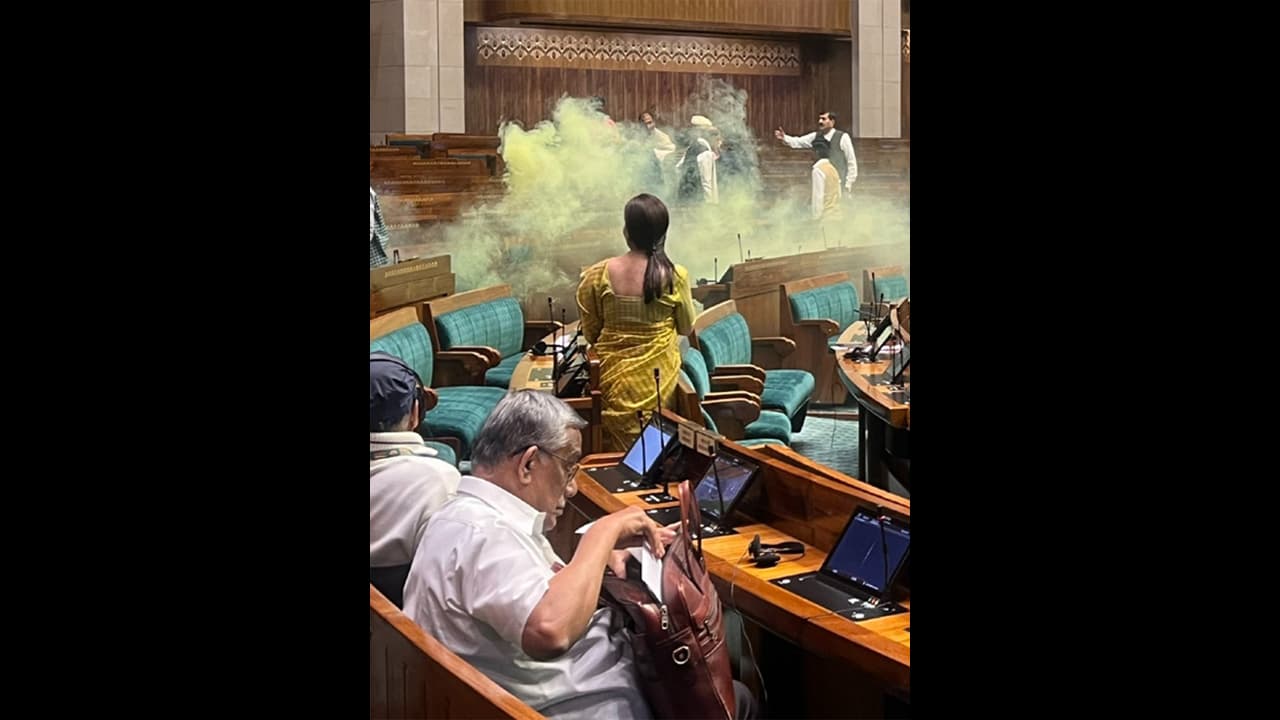In an audacious bid to defame Indian democracy and get global fame, the masterminds behind the December 13, 2023, Parliament security breach plotted a brazen attack aimed at the very core of India's democratic ideals
In an audacious bid to defame Indian democracy and get global fame, the masterminds behind the December 13, 2023, Parliament security breach plotted a brazen attack aimed at the very core of India's democratic ideals. According to the comprehensive chargesheet filed by the Delhi Police Special Cell, the conspirators harbored ambitions of not only discrediting the nation’s democratic framework but also achieving "richness and glory" through their targeted assault.

The plotters, whose initial interactions occurred via social media, meticulously orchestrated their scheme over nearly two years before executing it on the anniversary of the 2001 Parliament attack. The chargesheet reveals that their first in-person meeting took place in February 2022 in Mysuru, setting the stage for a series of meetings that spanned Mysuru, Gurugram, and Delhi.
Also read: Parliament security breach: Lok Sabha Speaker Om Birla bans visitors pass
The voluminous 1,000-page chargesheet, submitted to Patiala House Court in June and acknowledged by the court the following month, was supplemented in July. It discloses that the group, spearheaded by Manoranjan D from Karnataka, engaged in a series of strategic gatherings to refine their plan and finalize their modus operandi.
Manoranjan D among the six accused apprehended by the Delhi Police Special Cell, is alleged to be the kingpin of the breach. The chargesheet asserts that he instigated and motivated his cohorts with promises of "richness, glory, and wealth," targeting the "very symbol of democracy" with his radical vision.
Motivated by "ultra Maoist-inspired thinking," Manoranjan sought to dismantle the perception of Indian democracy as ineffective, aiming to convey a message that it required replacement. On the fateful day, the conspirators executed a coordinated gas attack both within and outside the Parliament during Zero Hour.
The assault saw two of the accused, Sagar Sharma and Manoranjan D, breach the Lok Sabha chamber from the public gallery, releasing yellow gas canisters and shouting slogans before being subdued by parliamentarians.
Simultaneously, Amol Shinde and Neelam Azad carried out a similar attack outside the Parliament premises, dispersing colored gases and chanting "tanashahi nahi chalegi" ("dictatorship won't be allowed"). The swift response by security forces led to the immediate arrest of Manoranjan, Sagar Sharma, Amol Shinde, and Neelam Azad. Lalit Jha and Mahesh Kumawat were apprehended on December 15 and 16, respectively.
All six accused are currently detained in Tihar Jail and face charges under Sections 16 and 18 of the Unlawful Activities (Prevention) Act (UAPA) alongside other provisions of the Indian Penal Code.
The chargesheet also delves into Manoranjan’s background, noting his dropout from engineering and subsequent travels. In 2014, he ventured to Cambodia, followed by a motorbike journey to Ladakh in 2015—a trip that mirrored the legendary "Motorcycle Diaries" of Che Guevara. During his Ladakh sojourn, a Chinese student from Hyderabad accompanied him, further emphasizing his radical inclinations.
The conspiracy unfolded through a series of meetings, the first being in February 2022 in Mysuru at a friend's flat, attended by ten participants including Manoranjan, Sagar Sharma, Amol Shinde, Lalit Jha, and Mahesh Kumawat.
At this gathering, Manoranjan showcased videos of violent protests and proposed the formation of a radical organization. Subsequent meetings detailed the use of various tactics, including "protective gel" and tear gas, and culminated in the decision to employ smoke canisters during the Parliament breach.
The final meetings, held in September and December 2023, refined their attack strategy, including securing entry passes and planning their incursion during the winter session. Their elaborate plot was executed with a precise coordination that saw them destroy their SIM cards and document their actions, intending to broadcast their defiance.
The case not only underscores the perilous lengths to which extremist elements are willing to go but also highlights the complex and extensive nature of their conspiracy to challenge the foundations of Indian democracy.
